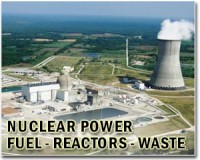 |
Kozloduy, Bulgaria (AFP) April 24, 2011 Bulgaria's sole nuclear plant at Kozloduy, spotlighted in the 1990s over safety issues, is looking forward to European stress tests, following Japan's nuclear disaster. "Our plant is the most controlled one in Europe: 25 missions over the last 12 years, including from the (UN nuclear watchdog) IAEA and WANO (World Associaton of Nuclear Operators)," Kozloduy's executive director Kostadin Dimitrov told AFP on a recent visit. A Soviet-built model, Kozloduy came to the attention of the West in the 1990s, after the fall of communism opened the way to western experts, who suddenly came face to face with an unknown and neglected technology. Like Chernobyl, Kozloduy's reactors lacked containment vessels -- seen as a key safety measure -- although the technology used at the two plants otherwise differed. As a prerequisite to starting EU accession talks, Sofia was forced to close its two oldest 440-megawatt reactors in 2002. Two more recent ones then followed just prior to Bulgaria joining the European Union in January 2007, despite undergoing modernisation work to compensate for their lack of a containment structure. Now only two 1,000-megawatt units remain in operation at the 37-year-old plant, but they are the most modern, built in 1987 and 1991, and brought up to date again a decade later. "From 2000 to 2008, units 5 and 6 underwent a major modernisation, carried out by an international team," that included France's Areva -- which oversees the plant's security systems -- US firm Westinghouse, Russia's Atomstroyexport and Germany's Siemens, noted Dimitrov. The government is also counting on these international partners to extend the units' life past their 2017 and 2019 operation end dates. "The attack in Europe from environmentalists and whole governments against old plants, including Kozloduy, will be fierce," Prime Minister Boyko Borisov warned last week. "And without its reactors, Bulgaria would go bankrupt." But Kozloduy is not waiting on Brussels to decide on criteria for the nuclear stress tests and has already launched an intensive examination of all its systems, including its reaction in the event of a terrorist attack, a fire or floods, Dimitrov said: "We will work on what we deem necessary (for now) and then on the new (European) requirements when they have been decided," he said. Once the number one electricity exporter in the Balkans, Bulgaria lost this prime position with the closure of four of its reactors, which is one of the reasons Sofia has been seeking to build a second nuclear plant at Belene, on the Danube -- a project that has nevertheless been stalled for years. Opinion polls show Bulgarians generally favour nuclear power, seen as the cheapest source of energy: according to a recent Gallup poll, 48 percent backed the Belene project, while only 15 percent opposed it. In Kozloduy, a town of 23,000 located in the EU's poorest region according to European data, many are confident the plant -- a key source of income and jobs -- will stand up to any tests. "Foreign pressure has made the plant even safer," said Daniela Mitrenova, whose husband works there. "A tsunami like the one in Japan will not happen on the Danube," student Ivelina Dimitrova added with a smile.
Share This Article With Planet Earth
Related Links Nuclear Power News - Nuclear Science, Nuclear Technology Powering The World in the 21st Century at Energy-Daily.com
 Japan to stick with nuclear power: ruling party
Japan to stick with nuclear power: ruling partyTokyo (AFP) April 22, 2011 Japan will review its energy policy in light of the Fukushima atomic plant disaster but will stick with nuclear power, the secretary general of the centre-left ruling party said Friday. The March 11 earthquake-triggered tsunami that devastated Japan's northeast coast slammed into the plant, causing reactors to overheat in a crisis that its operator has said will not be stabilised until at le ... read more |
|
| The content herein, unless otherwise known to be public domain, are Copyright 1995-2010 - SpaceDaily. AFP and UPI Wire Stories are copyright Agence France-Presse and United Press International. ESA Portal Reports are copyright European Space Agency. All NASA sourced material is public domain. Additional copyrights may apply in whole or part to other bona fide parties. Advertising does not imply endorsement,agreement or approval of any opinions, statements or information provided by SpaceDaily on any Web page published or hosted by SpaceDaily. Privacy Statement |